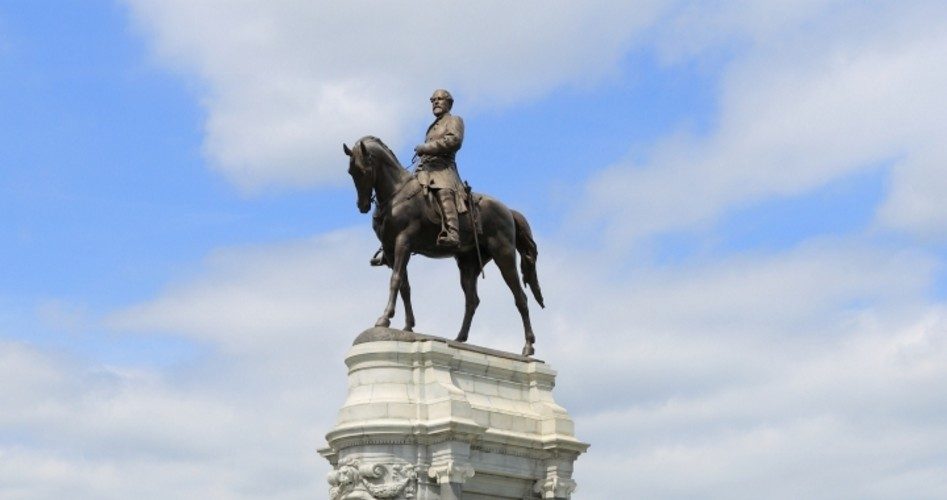
The circuit court judge who temporarily blocked the removal of Robert E. Lee’s statue in Richmond on June 8 has extended his order indefinitely and given the plaintiff in the lawsuit against Governor Ralph Northam 21 days to prove standing to sue.
Judge Bradley Cavedo flatly told the governor he does not own the statue and cannot remove it, suggesting that if Northam can remove Lee, he can remove any statue he wants.
Northam’s legal hitman, Attorney General Mark Herring, promised unending legal war until Lee’s monument is removed.
What will happen to the statue after it is removed is unknown, although Northam, Herring, and their gang of violent, iconoclast rabble likely want it destroyed.
Original Lawsuit
After Northam ordered the statue removed on June 4 because “in Virginia, we no longer preach a false a version of history … that pretends the Civil War was about ‘state rights’ and not the evils of slavery,” William Gregory sued to stop the leftist governor.
Gregory argued that Northam — who dabbled in minstrelsy during medical school — can’t remove the statue because doing so would break the contract that Governor P.W. McKinney signed with Gregory’s great grandparents, Roger Gregory and Bettie F. Allen Gregory, in 1890.
That contract deeded the land where the monument sits to Virginia, and requires Virginia to “faithfully guard it and affectionately protect it”:
If the injunction is not granted, the defendant will be free to remove the Lee Monument. The removal would inherently result in irreparable harm to the Plaintiff. His family has taken pride for 130 years in the statue resting upon land belonging to his family and transferred to the Commonwealth in consideration of the Commonwealth contractually guaranteeing to perpetually care for and protect the Lee Monument.
Cavedo agreed.
Gregory is “likely to prevail on his claim,” he wrote, and “there is a likelihood of irreparable harm to the statue if removed as proposed by defendants.”
As well, he ruled “it is in the public interest to await resolution of this case on the merits prior to removal of the statue by defendants, and the public interest weighs in favor of maintaining the status quo.”
And “little harm will be suffered by defendants by the issuance of a temporary injunction.”
And so Northam’s plan to begin erasing the memory of one of the nation’s greatest heroes had to wait.
Thursday Ruling
On Thursday, Cavedo cemented that order indefinitely, but did rule that Gregory had not proved he had the standing to sue the governor. Gregory has three weeks to make his case.
Herring, another of Virginia’s Democrats partial to wearing blackface, was none too happy about it and promised “to use every legal avenue we have” to tear the monument down, the Washington Post reported.
“The governor has the authority” to take down the statue, Herring averred in falsely claiming it is “a symbol of Virginia’s racist past.”
Herring said Gregory “did not have the ability to veto the governor’s direction, the Post reported, and that “the governor is the person who is in a position to make those decisions and is the democratically elected person to represent the views of the entire commonwealth.”
Not so, said Cavedo, who offered the reductio ad absurdum of the governor’s claim.
“The state seems to think that the monument is the property of the governor,” Cavedo said. “My view is that the monument is the property of the people of the commonwealth, and the governor is more of a custodian or fiduciary on their behalf”:
To think the governor could take down the monument to George Washington and the Founding Fathers on Capitol Square, or the Houdon marble in the rotunda [of the Capitol] — I don’t think he has any authority to do something like that. It belongs to the people.
But that won’t much matter, given the vandalism of Confederate monuments and even a statue of Christopher Columbus. After Cavedo’s ruling on June 8, vandals tore down the statue of Confederate President Jefferson Davis and then threw a Columbus statue in a lake, and Northam did nothing.
Richmond Mayor Levar Stoney has promised to remove other Confederate monuments as soon as possible after a new state law that permits localities to decide on such memorials takes effect on July 1.
Image: Martin Falbisoner/Wikimedia Commons
R. Cort Kirkwood is a long-time contributor to The New American and a former newspaper editor.


